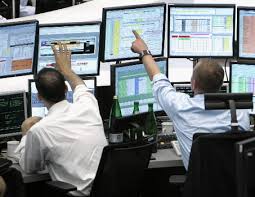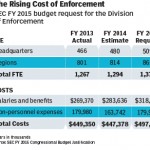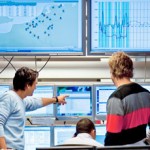Slow Your Judgments on Fast Trading

In a recent pair of articles, hedge-fund magnate Cliff Asness defended high-frequency trading against most of the attacks that have been leveled against it. Asness is known for his strong opinions. And while I’m generally on his side in this case, a careful reading of his articles shows that he may have overstated his case and we shouldn’t be so quick to conclude that HFT is completely benign.
A lot of people claim that HFT is legalized front running, allowing traders to improperly buy or sell ahead of customers. Asness defends HFT from this claim by narrowing the definition of front running; he insists that if you don’t trade on information that was entrusted to you, you aren’t really front running:
Front running…relates to the use of information entrusted to you by a client to get ahead of the market. That is illegal and unethical…This is decidedly not what is going on with HFT.
Still, HFTs are often accused of “front running.” Let’s be clear, HFTs indeed try to do something like this, but all, or almost all…of it is legal, ethical, and only uses public
Speed advantages can help HFTs get information faster than others, but it cannot help them get information that was never available to them…
(I)f HFTs did buy ahead of (an) investor on…other exchanges, that would not be considered front running. The HFTs were only making educated guesses. They saw a trade and guessed that the buyer wanted more, or that more buyers would come to market…
Most of what is being talked about as “front running” is really just the legal, ethical and economically beneficial practice of order anticipation, which is a fancy word for educated guessing.
What Asness is calling “order anticipation” with “speed advantages” is what most of the people out there are calling “front running.” Like the word “arbitrage,” the term “front running” has come to have a colloquial meaning that is more expansive than its dictionary definition. Focusing on definitions doesn’t change the crux of the matter.
The crux of the matter is that lots of people, unlike Asness, think that “order anticipation” with “speed advantages” is not “economically beneficial.” Why not? Because it might increase trading costs. Most people agree that HFTs have reduced bid-ask spreads. But bid-ask spreads aren’t the only kind of trading cost; for many investors, slippage and price impact are a much bigger deal. Slippage, also called implementation shortfall, is the difference between the price that triggers the decision to trade and the actual execution price. It matters for people who use market orders, or the best immediate price. Price impact matters to people who split their trades into pieces.
If HFTs have big speed advantages and very good guesses about the decisions of non-HFT investors, they might theoretically be able to increase slippage and price impact for non-HFTs. That would increase total trading costs for non-HFTs, thus discouraging them from trading. If non-HFTs are bringing important information to the market by their trading, then the net effect of HFT could reduce the informational efficiency of markets. That’s not good. It’s the kind of thing that Michael Lewis worries about in “Flash Boys,” although it’s couched in different terms.
Is this happening, though? Charles Jones of Columbia Business School cites a report that shows that slippage in large-cap U.S. stocks has actually fallen slightly since HFT started coming into the market. Price impact, too, has fallen. In other words, although HFTs are picking people off, people aren’t getting picked off as much as in the pre-HFT days, overall.
But a word of caution — the decrease in slippage and price impact might be happening because informed traders are now staying out of the market in response to HFT itself. If that’s happening, it isn’t a reason for celebration — it’s like saying the Spanish flu decreased the death rate from heart disease. The problem is that it’s very hard, if not impossible, to tell how much information is getting pumped into market prices via trading. The increase in the use of dark pools might be the result of informed traders fleeing the public exchanges in an effort to escape HFTs.
This is speculative, of course — I lean toward the view that HFT hasn’t made markets less efficient. But it’s a reason to be cautious, given our ignorance.
One important thing that Asness doesn’t mention is the staggering cost associated with HFT. The total amount of money spent on actually carrying out HFT runs to many billions of dollars. Those billions represent real resources — computing cycles, fiber-optic cable and the effort of lots of very smart people.
What is the social benefit of all that expenditure? Does the reduction in bid-ask spreads — the much-vaunted liquidity provision of HFTs — really help companies know when to invest, buy back shares, issue dividends, etc.? Does it really help people use markets to share risk? It isn’t clear. We’ve understood at least since Jack Hirshleifer’s famous 1971 paper that the private benefit of getting information can exceed the social benefit. In other words, the billions HFTs spend in order to beat people to the punch by a couple of milliseconds might not be boosting the economy as a whole.
Finally, Asness doesn’t deal with the issue of dark pools, and whether they aid high-frequency traders in front running. Dark pools lack transparency, and the flood of activity into them could result in overly trusting participants getting swindled. For example, the other day, the SEC caught a dark pool front-running its users. Yes, actual, real, dictionary-definition front-running.
So these are some reasons that we should be more cautious than Cliff Asness in concluding that HFT is just fine. That doesn’t mean we should just assume HFT is evil and clobber it with the long arm of the law; that’s been shown to have some negative effects, and HFTs should be treated as innocent until proven guilty. I think the Securities and Exchange Commission’s slow, cautious investigation of the HFT issue seems just about right. Let’s not fall victim to high frequency judgment.
Source: bloomberg





























